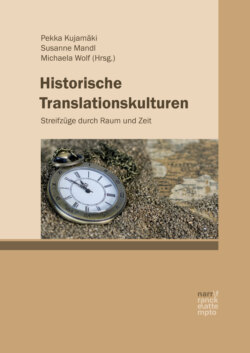Читать книгу Historische Translationskulturen - Группа авторов - Страница 43
4 Conclusion
ОглавлениеThis paper set out to investigate the possible existence of Celtic translation culture(s). The concept of translation culture is understood as the consent and dissent of a society concerning translation, reflecting the prevailing power relations and values as well as shaping the receiving culture. To explore this idea, the texts, the translation strategies, the translators, and the reasons for the translations were discussed for the Celtic languages in the late nineteenth century. Parallels and differences between the Celtic languages were identified in relation to all of these aspects.
Furthermore, it was shown that other cultural developments, such as cultural policy and language policy, are also a part of a translation culture. One development which has been revealed in this paper is the shared experience of a Celtic Revival between the Celtic regions in the British Isles and Lower Brittany. In all of these regions, but in particular in relation to Irish, Scottish Gaelic and Welsh, the local Celtic language and culture were promoted and encouraged around the turn of the century in a more intensive manner than previously seen. Pan-Celtic communication between the regions was also flourishing, with publications, festivals and congresses providing a framework for interregional discourse and a means of supporting parallel revivals taking place in neighbouring Celtic regions. This shared cultural revival was also one of the main reasons why translations were written.
Aside from cultural interest, these translations also had strong political motivations: when considering all of the aspects of a translation culture discussed in this paper, one of the common denominators of almost all of the Celtic translation cultures is that it can be considered a post-colonial movement. On the one hand, the Celtic nations tried to revive and learn more about their own culture through language and translation. On the other hand, although they translated into the language of the colonial power, they claimed ownership of the language by doing so, creating their own colloquial form of English based on the structure of the Celtic languages in their translations.
This political dimension was the main reason for considering the possibility of Celtic translation cultures in contrast to a British translation culture. As illustrated in the introduction, the term British is problematic as it is politically biased and often used incorrectly. Celtic, on the other hand, does not have a political connotation and could thus be used as an impartial starting point for future research. Furthermore, due to the wealth of languages in the region, translation traditions need to be viewed from different angles using more than one concept. One of these angles is to look at languages and cultures rather than nations due to the lack of clear boundaries. This approach as well as a different and more conscious choice of terminology opens up new research perspectives.
This field of research is still in its infancy and this paper can be seen as a first stimulus to encourage further research. Part of this research would be to include further categories for the analysis of Celtic translation cultures, such as for example the official language and translation policy or more detailed information on the translation agents.
